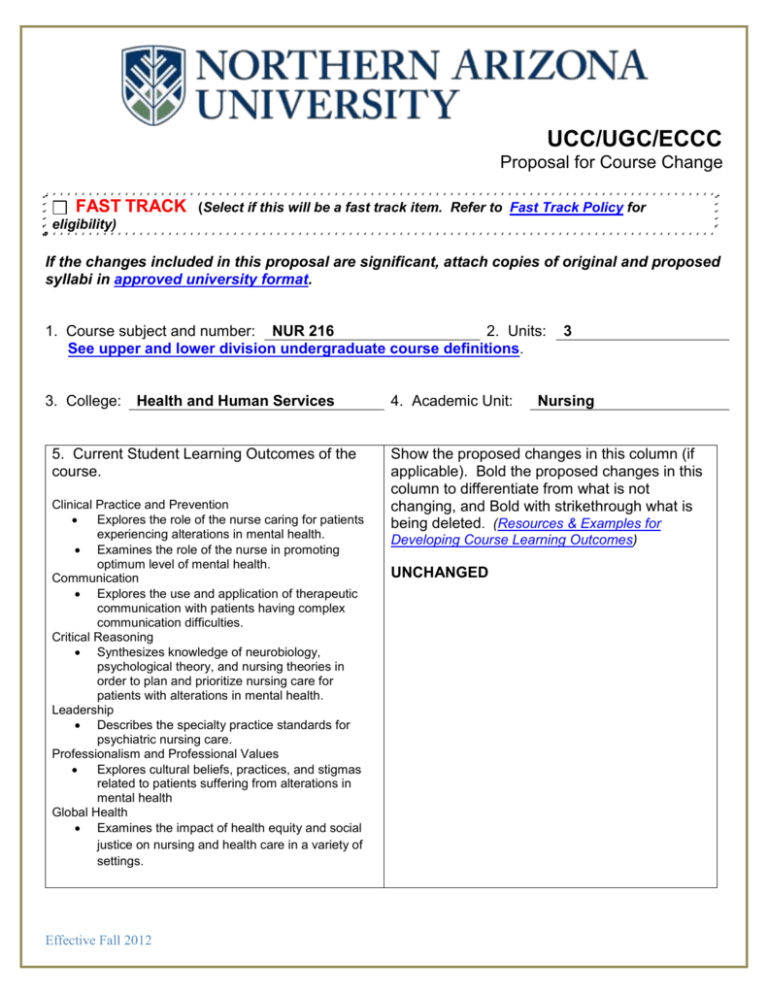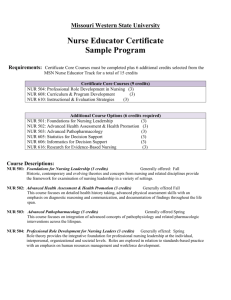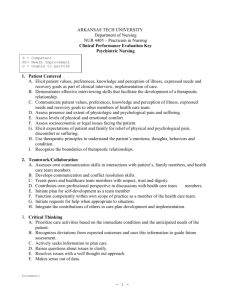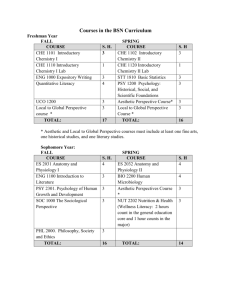NUR 216 - nau.edu - Northern Arizona University
advertisement

UCC/UGC/ECCC Proposal for Course Change FAST TRACK (Select if this will be a fast track item. Refer to Fast Track Policy for eligibility) If the changes included in this proposal are significant, attach copies of original and proposed syllabi in approved university format. 1. Course subject and number: NUR 216 2. Units: See upper and lower division undergraduate course definitions. 3. College: Health and Human Services 5. Current Student Learning Outcomes of the course. Clinical Practice and Prevention Explores the role of the nurse caring for patients experiencing alterations in mental health. Examines the role of the nurse in promoting optimum level of mental health. Communication Explores the use and application of therapeutic communication with patients having complex communication difficulties. Critical Reasoning Synthesizes knowledge of neurobiology, psychological theory, and nursing theories in order to plan and prioritize nursing care for patients with alterations in mental health. Leadership Describes the specialty practice standards for psychiatric nursing care. Professionalism and Professional Values Explores cultural beliefs, practices, and stigmas related to patients suffering from alterations in mental health Global Health Examines the impact of health equity and social justice on nursing and health care in a variety of settings. Effective Fall 2012 4. Academic Unit: 3 Nursing Show the proposed changes in this column (if applicable). Bold the proposed changes in this column to differentiate from what is not changing, and Bold with strikethrough what is being deleted. (Resources & Examples for Developing Course Learning Outcomes) UNCHANGED 6. Current title, description and units. Cut and paste, in its entirety, from the current on-line academic catalog* http://catalog.nau.edu/Catalog/. Show the proposed changes in this column Bold the proposed changes in this column to differentiate from what is not changing, and Bold with strikethrough what is being deleted. NUR 216 PSYCHIATRIC/MENTAL HEALTH NURSING (3) Description: Emphasis on nursing strategies for promoting, maintaining, and restoring mental health utilizing therapeutic nursing interventions for clients along the mental health/disorder continuum. Letter grade only. Course fee required. Units: 3 Prerequisite: NUR 208, NUR 208L, NUR 390W Co requisite: NUR 212, NUR 212L, NUR 216L NUR 216 349 PSYCHIATRIC/MENTAL HEALTH NURSING (3) Description: Emphasis on nursing strategies for promoting, maintaining, and restoring mental health utilizing therapeutic nursing interventions for clients along the mental health/disorder continuum. Letter grade only. Course fee required. Units: 3 Prerequisite: NUR 208, NUR 208L, NUR 345, NUR 345L, NUR 390W Co requisite: NUR 212, NUR 212L, NUR 347, NUR 347L, NUR 216L 349L *if there has been a previously approved UCC/UGC/ECCC change since the last catalog year, please copy the approved text from the proposal form into this field. 7. Justification for course change. NUR 216 and NUR 216L are required in the third semester of the professional program (second semester junior year). Course number change to upper division better reflects the course content and how it is currently offered. 8. Effective BEGINNING of what term and year? FALL 2015 See effective dates calendar. IN THE FOLLOWING SECTION, COMPLETE ONLY WHAT IS CHANGING CURRENT Current course subject and number: PROPOSED Proposed course subject and number: NUR 216 NUR 349 Current number of units: Proposed number of units: Current short course title: Proposed short course title (max 30 characters): Current long course title: Proposed long course title (max 100 characters): Current grading option: letter grade pass/fail or both Current repeat for additional units: Proposed grading option: letter grade pass/fail or both Proposed repeat for additional units: Current max number of units: Proposed max number of units: Effective Fall 2012 Current prerequisite: Current co-convene with: Proposed prerequisite (include rationale in the justification): Proposed co-requisite (include rationale in the justification): Proposed co-convene with: Current cross list with: Proposed cross list with: Current co-requisite: 9. Is this course in any plan (major, minor, or certificate) or sub plan (emphasis)? Yes No If yes, describe the impact. If applicable, include evidence of notification to and/or response from each impacted academic unit. Nursing; B.S.N. 10. Is there a related plan or sub plan change proposal being submitted? If no, explain. Yes No 11. Does this course include combined lecture and lab components? Yes If yes, include the units specific to each component in the course description above. No Answer 12-15 for UCC/ECCC only: 12. Is this course an approved Liberal Studies or Diversity course? If yes, select all that apply. Liberal Studies Diversity Both Yes No 13. Do you want to remove the Liberal Studies or Diversity designation? If yes, select all that apply. Liberal Studies Diversity Both Yes No 14. Is this course listed in the Course Equivalency Guide? Yes No 15. Is this course a Shared Unique Numbering (SUN) course? Yes No FLAGSTAFF MOUNTAIN CAMPUS Scott Galland Reviewed by Curriculum Process Associate 1/12/2015 Date Approvals: Department Chair/Unit Head (if appropriate) Date Chair of college curriculum committee Date Effective Fall 2012 Dean of college Date For Committee use only: UCC/UGC Approval Approved as submitted: Approved as modified: Date Yes Yes No No EXTENDED CAMPUSES Reviewed by Curriculum Process Associate Date Approvals: Academic Unit Head Date Division Curriculum Committee (Yuma, Yavapai, or Personalized Learning) Date Division Administrator in Extended Campuses (Yuma, Yavapai, or Personalized Learning) Date Faculty Chair of Extended Campuses Curriculum Committee (Yuma, Yavapai, or Personalized Learning) Date Chief Academic Officer; Extended Campuses (or Designee) Date Approved as submitted: Approved as modified: Effective Fall 2012 Yes Yes No No CURRENT/PROPOSED SYLLABUS Course Number: College of Health and Human Services School of Nursing Syllabus Fall 2014 NUR 216 349 Course Title: Psychiatric/ Mental Health Nursing Semester Offered: Fall 2014 Credit/Clock Hours: 3 credit hours/45 clock hours (online) Faculty: Kathy Ingelse, DNP, RN, PMHNP-BC, FNP-BC Office: Office hours by appointment E-mail: Use Course E-mail Course Prerequisites: NUR 208, NUR 208L & NUR 390W NUR 345, NUR 345L, NUR 390W Co-requisites: NUR 216L, NUR 212 & NUR 212L NUR 347, NUR 347L, NUR 349L Course Description: Emphasis will be on nursing strategies for promoting, maintaining, and restoring mental health utilizing therapeutic nursing interventions for clients along the mental health/ disorder continuum. Course Approach: NUR 216 349 will utilize a variety of approaches to meet the course outcomes. These instructional methods may include but are not limited to the following: online discussion, audio-visual material, case studies, group work, presentations and written assignments. While the faculty will provide guidance and consultation, the student is responsible for identification of learning needs, selfdirection, seeking consultation and demonstration of course and clinical objectives. A required concurrent clinical provides opportunity for the students to apply learning in actual and simulated patient care settings. Student Learning Outcomes: Upon completion of the course, the successful student Clinical Practice and Prevention Explores the role of the nurse caring for patients experiencing alterations in mental health. Examines the role of the nurse in promoting optimum level of mental health. Communication Effective Fall 2012 Explores the use and application of therapeutic communication with patients having complex communication difficulties. Critical Reasoning Synthesizes knowledge of neurobiology, psychological theory, and nursing theories in order to plan and prioritize nursing care for patients with alterations in mental health. Leadership Describes the specialty practice standards for psychiatric nursing care. Professionalism and Professional Values Explores cultural beliefs, practices, and stigmas related to patients suffering from alterations in mental health Global Health Examines the impact of health equity and social justice on nursing and health care in a variety of settings. Required Text: Kneisl, C., & Trigoboff, E. (2013). Contemporary psychiatric-mental health nursing 3rd ed. San Francisco, CA: Pearson. ISBN VP 10: 0133056589 Recommended Readings and Other Materials: An up-to-date Nurse's Drug Guide Journal articles may be used as resources Web Sites may also be used as resources Course Outline: Lesson 1 Week 1: Introduction to Mental Health and Disorders, evaluation Week 2: Introduction to Psychopharmacology, Communication Lesson 2 Week 3: Family, Theories, Cultural competence, Violence Lesson 3 Week 4: Anxiety and Treatment Modalities, Nursing responsibilities (pharmacologic and nonpharmacologic) Week 5: Anxiety continued Lesson 4 Week 6: Mood Disorders and Treatment Modalities Week 7: Suicide Assessment, Nursing responsibilities, (pharmacologic and non-pharmacologic) Lesson 5 Week 8: Psychosis, Recovery and Rehabilitation Week 9: Delirium and Dementia, Nursing responsibilities (pharmacologic and non-pharmacologic) Lesson 6 Week 10: Interventions Beyond Medications; Crisis, Therapeutics: Cognitive, Complementary Lesson 7 Week 11: Substance Abuse, Nursing Responsibilities Effective Fall 2012 Week 12: Personality Disorders, Nursing responsibilities (pharmacologic and non-pharmacologic) Lesson 8 Week 13: Eating Disorders, Adolescence, Week 14: Legal/Ethical issues in Psychiatric/Mental Health Nursing Week 15: Review of psychopharmacology, Kaplan Integrated test Week 16: Finals week Assessment of Student Learning Assignment Pre-test psychiatric medication content covering chapters 7 and 31 from Kneisl & Trigoboff (2013) Online Small Group blogging (4 topics) at 10 points Chapter Quizzes (6) at 4 points Practice tests (3) at 2 points (You must achieve 78% or more on each of the three practice tests to earn the points associated with each test) Psych Kaplan (In order to receive these points, you must achieve a passing score on the Kaplan. Passing score is established by national standards, to be determined and announced at time of exam) Final Exam: Total Points 10 points 40 points 24 points 6 points 5 points 15 points 100 points Grading System: You must have a 78% on quizzes/exams to pass the course. Below 78% cannot progress. Grading System: The NAU SON grading scale is as follows. No rounding. 93-100% 84-92% 78-83% <78 % A B C F (failing) Course Policies: Retests/makeup tests: Quizzes and exams will be available only during the dates and times scheduled; however, arranging for an alternate/extended time to access a quiz or exam will be provided only in extraordinary circumstances and require arrangements with faculty prior to scheduled test date. Attendance: Under NAU Policy, students are expected to attend every session of class in which they are enrolled. Active participation in online learning activities is considered to be essential to the learning process, as the faculty believes that such engagement facilitates learning. As you will be responsible for the content presented in the course, it is to your advantage to participate fully. Academic Dishonesty/Plagiarism: All forms of student academic dishonesty, including cheating, fabrication, facilitating academic dishonesty and plagiarism are prohibited and subject to disciplinary action. Cheating means Effective Fall 2012 intentionally using or attempting to use unauthorized materials, information or study aids in any academic exercise. Fabrication means intentional and unauthorized falsification or invention of any information or citation in an academic exercise. Plagiarism means intentionally or knowingly representing the words or ideas of another, as one's own in any academic exercise. For further explanation of academic dishonesty refer to the School of Nursing Undergraduate Student Handbook and Northern Arizona University Student Handbook. University policies Review the following policies available on the Northern Arizona University Policy Statement website http://www4.nau.edu/avpaa/UCCPolicy/plcystmt.html: 1. Safe Environment Policy 2. Students with Disabilities Policy 3. Academic Contact Hour Policy 4. Academic Integrity Policy (also see http://home.nau.edu/images/userimages/awf/9476/ACADEMIC%20DISHONESTY.pdf) 5. Research Integrity Policy 6. Sensitive Course Materials Policy Classroom Disruption Policy (also see http://nau.edu/uploadedFiles/Administrative/EMSA_Sites/Folder_Templates/_Forms/Classroom_Disr uption_Policy.pdf Effective Fall 2012






